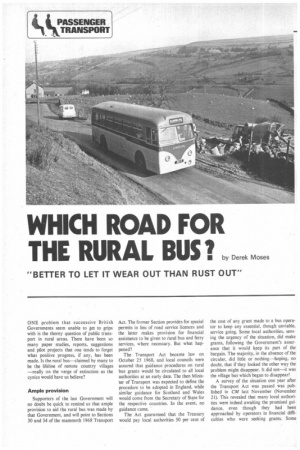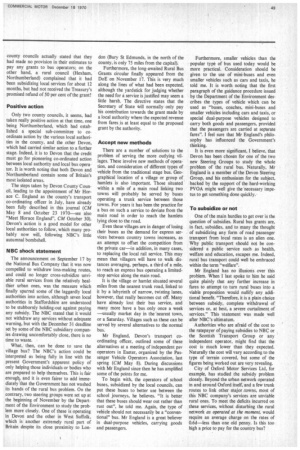WHICH ROAD FOR THE RURAL BUS?. by De ek.oses
Page 50

Page 51

If you've noticed an error in this article please click here to report it so we can fix it.
"BETTER TO LET IT WEAR OUT THAN RUST OUT"
ONE problem that successive British Governments seem unable to get to grips with is the thorny question of public transport in rural areas. There have been so many paper studies, reports, suggestions and pilot projects that one tends to forget what positive progress, if any, has been made. Is the rural bus—claimed by many to be the lifeline of remote country villages —really on the verge of extinction as the cynics would have us believe?
Ample provision Supporters of the last Government will no doubt be quick to remind us that ample provision to aid the rural bus was made by that Government, and will point to Sections 30 and 34 of the mammoth 1968 Transport Act. The former Section provides for special permits in lieu of road service licences and the latter makes provision for financial assistance to be given to rural bus and ferry services, where necessary. But what happened?
The Transport Act became law on October 25 1968, and local councils were assured that guidance procedures on rural bus grants would be circulated to all local authorities at an early date. The then Minister of Transport was expected to define the procedure to be adopted in England, while similar guidance for Scotland and Wales would come from the Secretary of State for the respective countries. In the event, no guidance came.
The Act guaranteed that the Treasury would pay local authorities 50 per cent of the cost of any grant made to a bus operator to keep any essential, though unviable, service going. Some local authorities, sensing the urgency of the situation, did make grants, following the Government's assurance that it would keep its part of the bargain. The majority, in the absence of the circular, did little or nothing—hoping, no doubt, that if they looked the other way the problem might disappear. It did not—it was the village bus which began to disappear!
A survey of the situation one year after the Transport Act was passed was published in CM last November (November 21). This revealed that many local authorities were indeed awaiting the promised guidance, even though they had been approached by operators in financial difficulties who were seeking grants. Some county councils actually stated that they had made no provision in their estimates to pay any grants to bus operators; on the other hand, a rural council (Hexham, Northumberland) complained that it had been subsidizing local services for about 12 months, but had not received the Treasury's promised refund of 50 per cent of the grant!
Positive action Only two county councils, it seems, had taken really positive action at that time, one being Northumberland, which had established a special sub-committee to coordinate action by the various local authorities in the county, and the other Devon, which had carried similar action to a further stage. Indeed, it is to Devon that the credit must go for pioneering co-ordinated action between local authority and local bus operator. It is worth noting that both Devon and Northumberland contain some of Britain's most isolated areas.
The steps taken by Devon County Council, leading to the appointment of Mr Horace C. England as the county's transport co-ordinating officer in July, have already been fully described in this journal (CM May 8 and October 23 1970—see also "Meet Horace England". CM October 30). Devon's action is a good model for other local authorities to follow, which many probably now will, following NBC's little autumnal bombshell.
NBC shock statement The announcement on September 17 by the National Bus Company that it was now compelled to withdraw loss-making routes, and could no longer cross-subsidize unviable rural services from the relatively healthier urban ones, was the measure which finally spurred some of the laggardly local authorities into action, although seven local authorities in Staffordshire are understood to be stubbornly holding-out against paying any subsidy. The NBC stated that it would not withdraw any services without adequate warning, but with the December 31 deadline set by some of the NBC subsidiary cornpanies drawing uncomfortably close, there is no time to waste.
What, then, can be done to save the village bus? The NBC's action could be interpreted as being fully in line with the present Government's apparent policy of only helping those individuals or bodies who are prepared to help themselves. This is fair enougli, and it is even fairer to add immediately that the Government has not washed its hands of the rural bus problem. On the contrary, two steering groups were set up at the beginning of November by the Department of the Environment to study the problem more closely. One of these is operating in Devon and the other in West Suffolk, which is another extremely rural part of Britain despite its close proximity to Lon
don (Bury St Edmunds, in the north of the county, is only 75 miles from the capital).
Furthermore, the long-awaited Rural Bus Grants circular finally appeared from the DoE on November 17. This is very much along the lines of what had been expected, although the yardstick for judging whether the need for a service is justified may seem a little harsh. The directive states that the Secretary of State Will normally only pay his contribution towards the grant made by a local authority where the expected revenue from fares is at least equal to the proposed grant by the authority.
Accept new methods There are a number of solutions to the problem of serving the more outlying villages. These involve new methods of operation, and consideration of different types of vehicle from the traditional stage bus. Geographical location of a village or group of hamlets is also important. Those situated within a mile of a main road linking two towns will probably be served by buses operating a trunk service between those towns. For years it has been the practice for a bus on such a service to deviate from the main road in order to reach the hamlets lying close to the road.
Even these villages are in danger of losing their buses as the demand for express services between country towns increases, as an attempt to offset the competition from the private car—in addition, in many cases, to replacing the local rail service. This may mean that villagers will have to walk distances averaging, perhaps, a third of a mile, to reach an express bus operating a limitedstop service along the main road.
It is the village or hamlet situated several miles from the nearest trunk road, linked to it by a labyrinth of narrow, twisting lanes, however, that really becomes cut off. Many have already lost their bus service, and many more have a bus only once a week —usually market day in the 'nearest town, or a Saturday. Villages such as these can be served by several alternatives to the normal bus.
Mr England, Devon's transport coordinating officer, outlined some of these alternatives at a meeting of independent psv operators in Exeter, organized by the Passenger Vehicle Operators Association, last spring (CM May 8). During discussions with Mr England since then he has amplified some of the points for me.
To begin with, the operators of school buses, subsidized by the local councils, can put these buses to better use between the school journeys, he believes. "It is better that these buses should wear out rather than rust out", he told me. Again, the type of vehicle should not necessarily be a "conventional" bus. Mr England is a great believer in dual-purpose vehicles, carrying goods and passengers. Furthermore, smaller vehicles than the popular type of bus used today would be more practical. Consideration should be given to the use of mini-buses and even smaller vehicles such as cars and taxis, he told me. It is worth noting that the first paragraph of the guidance procedure issued b3k the Department of the Environment describes the types of vehicle which can be used as "buses, coaches, mini-buses and smaller vehicles including cars and taxis, or special dual-purpose vehicles designed to carry both goods and passengers, provided that the passengers are carried at separate fares". I feel sure that Mr England's philosophy has influenced the Government's thinking.
It is even more significant, I believe, that Devon has been chosen for one of the two new Steering Groups to study the whole problem of the rural bus. Naturally, Mr England is a member of the Devon Steering Group, and his enthusiasm for the subject, backed by the support of the hard-working PVOA might well give the 'necessary impetus to get something done quickly.
To subsidize or not One of the main hurdles to get over is the question of subsidies. Rural bus grants are, in fact, subsidies, and to many the thought of subsidizing any form of road passenger transport from local rates is an alien one. Why public transport should not be considered a public service such as health, welfare and education, escapes me. Indeed, rural bus transport could well be embraced within the term "welfare".
Mr England has no illusions over this problem. When I last spoke to him he said quite plainly that any further increase in fares to attempt to turn rural buses into a viable proposition would nullify any additional benefit. "Therefore, it is a plain choice between subsidy, complete withdrawal of services or, at best, a severe curtailment of services." This statement was made well after NBC's ultimatum.
Authorities who are afraid of the cost to the ratepayer of paying subsidies to NBC or the Scottish Transport Group or any independent operator, might find that the cost is much lower than they expected. Naturally the cost will vary according to the type of terrain covered, but some of the figures being worked out are very revealing.
City of Oxford Motor Services Ltd, for example, has studied the subsidy problem closely. Beyond the urban network operated in and around Oxford itself, and a few trunk routes to link other major .towns, most of this NBC company's services are unviable rural ones. To meet the deficits incurred on these services, without disturbing the rural network as operated at the moment, would require an average charge on the rates of 0.6d—less than one old penny. Is this too high a price to pay for the country bus?






















































































































